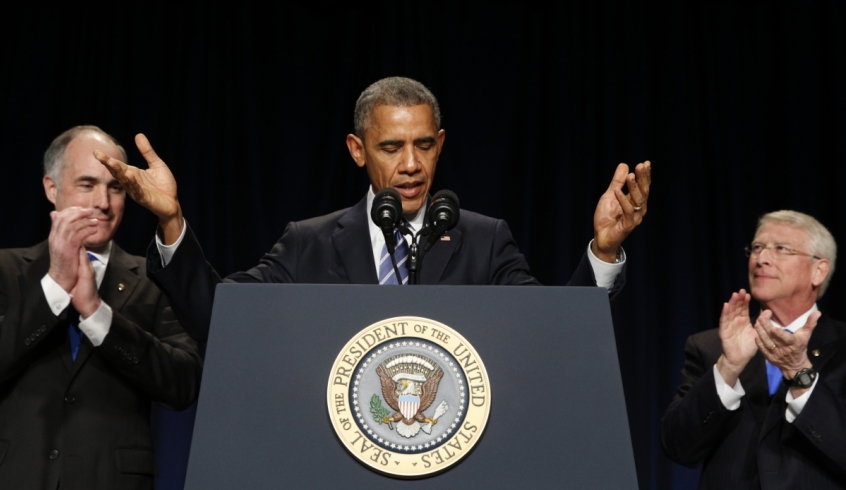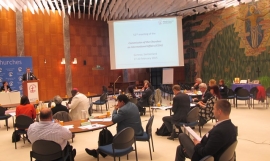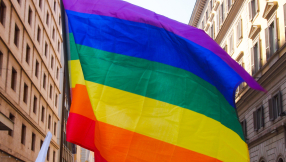
A few weeks ago, President Barack Obama whipped up a Conservative firestorm with a few words at a National Prayer Breakfast. Islamic State had just burned alive a Jordanian pilot and after condemning its actions, Obama pointed out that there had always been a tension between the compassionate and the murderous acts religion could inspire.
"Lest we get on our high horse and think this is unique to some other place, remember that during the Crusades and the Inquisition, people committed terrible deeds in the name of Christ," he said. "In our home country, slavery and Jim Crow all too often was justified in the name of Christ."
Cue the outrage: "The president's comments this morning at the prayer breakfast are the most offensive I've ever heard a president make in my lifetime," said former Virginia governor Jim Gilmore, to give but one example.
But an honest look at violence and religion forces us to conclude that they're much more closely linked than we might want to admit. A very typical accusation made by the 'New Atheists' is that "Religion causes wars": indeed, Richard Dawkins said that "Religion causes wars by generating certainty."
Islamic State in the Middle East, Boko Haram and the Lord's Resistance Army in Africa, Hindu extremists in India – examples of religiously inspired violence are all to easy to find.
But how strong is the link between religion and violence – and what can followers of the Prince of Peace do to sever it?
Matt Rowley is a PhD student based at Tyndale House in Cambridge, researching religion and violence in the light of 17th century Puritanism in Britain and America. Among his scholarly articles is "What Causes Religious Violence? Three Hundred Claimed Contributing Causes", published last year in the Journal of Religion and Violence.
"You can't just say that religion causes violence, there are so many problems with that," he tells Christian Today. Furthermore, "Over-simplifying the issue actually endangers peace."

Atheists like Dawkins, Sam Harris and Michael Onfray argue that the world would be a better and more peaceful place without religion. But, says Rowley: "Attempts to remove religion only cause more violence in the name of religion. If you remove someone's favourite breakfast cereal from the grocery story, they'll get angry. How much more when you try to take their religion away?"
Religion, in its multifarious manifestations, is here to stay. So the question – setting aside competing claims of truth and falsehood – is, what kind of religion? For Rowley, it's crucial to be self-critical about the sort of justifications our religion presents for violence. His research into the 17th century Puritans has led him into some dark places – both in Britain and America, the stories of violence in the Old Testament were used to justify and explain horrific acts committed in God's name by good Christians.
"Every day, I read an account of violence in the 17th century and I grieve; I enter their pain and I feel for them," Rowley says. "I get angry at the way spiritual warfare has become physical. I get angry when I read about American colonists slaughtering a whole village and attributing the violence to God."
But, he adds, "I meet with well-educated Christians on a regular basis, and I tell them I'm studying Puritan justifications for violence and they say, 'I didn't know Puritans were violent.'
"Every group tends to got through a process of forgetting its own history of violence. Christians do the same thing. If you want to have any continuity with Church history, you have to own up to the violence Christians have committed and justified."
So Obama was "on the right track" with his remarks about the Crusades, he says – and it's examples like that which have driven the Church to re-assess its attitude to violence over the years. Rowley says that it isn't true that religion is 'fundamentally' peaceful and that all peaceably-minded prophets and scholars need to do is remind people of that. Most religions have sacred texts which can encourage and promote violence, and most have plenty of examples of people who've sincerely believed that their violence acts were justified by their faith – and it's not good enough just to say, 'They were wrong.'
"For Christians, violence in the name of God has forced us to re-examine our sacred texts and self-criticise," Rowley argues. "Ultimately this will be needed in the Muslim world too. Any effort to force this from the outside will fail."
Any comparison between two religions is fraught with difficulty. However, he sees the Bible as having distinct advantages over the Koran when it comes to re-interpreting it in a way that critiques its violence rather than normalises it for Christians today.
"Mohammad stressed that he did not work miracles like Moses," says Rowley. "He seemed to emphasise that miracles only harden the heart. He didn't appeal to anything beyond his own experience. So the ultimate proof that God was on his side was victory in battle."
The Bible, on the other hand, starts and ends with 'shalom', and "The violence in between is less than ideal." Furthermore, while there are warrior-figures like Elijah and Moses, "the example of Christ is the loudest and final voice. Muslims have Mohammad, and that's a very different final voice."
Are there lessons from history for Islamic State? Yes, Rowley says. His Puritans were "continually looking at the world and seeing confirmation that God was on their side". Above all, their proof was victory in battle. "Only after the Cromwellian regime falls apart do they re-interpret Providence: 'We only lost because of our sin.'"
So, he believes that in Africa and the Middle East, if sheer pragmatism doesn't force them to compromise, terrorist regimes will continue until these groups disintegrate or until they suffer a catastrophic defeat, like the Puritans.
But in the here and now, he's anxious to emphasise the need for self-criticism: our faith has led Christians to commit violence in the past, and a polarisation between people of different faiths today can have the same effect.
"We need to be careful about the demonisation of Muslims," Rowley says. "Our foreign policy begins around the dinner table, with the stories we tell our friends and families about Muslims."
Most of us, after all, will never encounter Muslims in the East – but we're very likely to encounter them walking down the street.
So, does religion cause violence? The answer is that it can, and it does – but it's up to believers to make sure that it doesn't.















